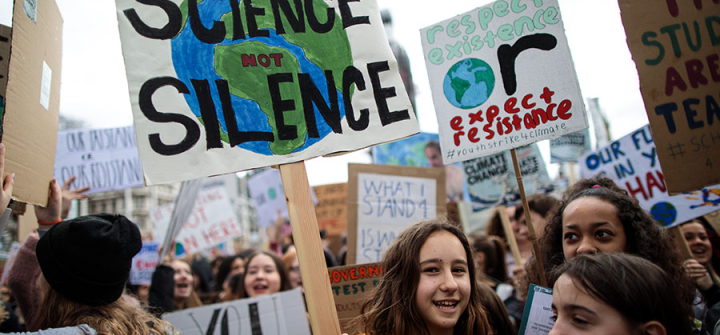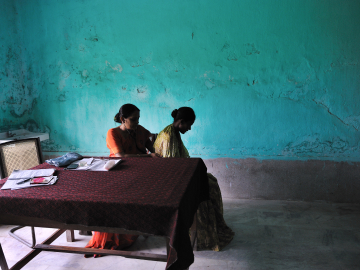The House Is on Fire: Women and Young People Forward
“Our house is still on fire… and we should act as though we love our children above all else.”
Perched on a stool to reach the microphone, an unwavering Greta Thunberg challenged the global elite with those words at the World Economic Forum in Davos early this year, just as the COVID-19 crisis was beginning. Many of those in the audience were reminded of the fact that she is—despite a world-resonant message—still a very young woman.
Worldwide advocacy for climate action would be quite different without the profound narrative of Thunberg. All species, including Homo sapiens, now face the unimaginable impacts of a potentially 4C-degree-warmer world by as early as 2060. Those of us working in global health have to ask how, in this existential crisis, we are framing leadership to make the substantial societal change that the Intergovernmental Panel on Climate Change says we must.
An important place to start: Ensuring young women like Thunberg have power to help make real institutional change. Corporations that have delivered the benefits and environmental damage of modern economies are male-dominated; just 4.8% of the top 500 multinational CEOs are women. Global health-related workforces in many countries are predominantly female, as are nurses and midwives, acknowledged by the WHO to be the foundation of every health system. Yet global health agency leadership remains male-dominated. Fewer than 1 in 10 national political leaders worldwide have been women, and only around 24% have served in parliaments or the equivalent. That’s half the level of civic leadership that there should be.
Will women govern differently when they are empowered in larger numbers? There is evidence that hospital boards inclusive of nurses (who are mostly female) are better performing in terms of quality and safety. But several meta-analyses have shown limited impact of female representation on corporate boards, likely because the few women in these positions don’t differ much from the men; other studies suggest that having at least 3 women on a board leads to different decision-making—suggesting a tipping point.
More women leaders in science and academia, the underlying knowledge generator for global health, also are needed. A February 2019 Lancet special issue laid out the “robust evidence of bias” against women in science, medicine, and global health. The UK’s Scientific Women’s Academic Network notes how universities are performing in terms of women in sciences; when the UK Minister of Health made a high SWAN rating a requirement for getting grants funded, women on faculty increased. In the US, the American Association for the Advancement of Science is now launching a similar initiative. The best reason to have more women in leadership roles, including in global health organizations, is because it is the right thing to do. And, making NGOs, companies, universities, and governments more egalitarian means that decisions crucial for addressing the climate crisis might have a better chance to be heard and enacted.
The COVID-19 global response is shedding new light on much of the widespread social, governmental, and multisector partnerships that will be required to slow the climate disaster. In many nations, the COVID-19 pandemic is ushering in the sense of shared humanity, interdependence, and changed behavior that are, ultimately, essential to promote strategic climate action now and in the future. On the other hand, COVID-19 is highlighting the international inequalities—including gender inequalities—that must be addressed and rectified if we as a human race will achieve a safe and inclusive world for all people by 2030 in alignment with the Sustainable Development Goals.
Because climate change demands creative leadership that will drive an urgent global response, we must move beyond simply avoiding “manels” at conferences and demand that women—and youth, racial and sexual minorities, and others who have not traditionally been visible in leadership roles—move to the forefront.
The next time a position of influence opens in your global health organization:
- Ensure that different voices are included in recruiting and hiring leaders.
- Track metrics of gender and other indicators of equity in representation.
- Reflect on implicit biases and welcome transparent dialogue in places of work and education.
Doing so—in our communities, agencies, and governments—will bring the cognitive diversity that can move us towards the mitigation and adaption strategies that are needed now. We cannot achieve the SDGs—or address climate change—without it. We should do this since we “love our children above all else.” And as global health workers, all children are our children.
Ann Kurth, PhD, CNM, MPH is the Dean and Linda Lorimer Professor at the Yale School of Nursing.
William E. Rosa, PhD, MBE, NP-BC is a Postdoctoral Research Fellow in Psycho-Oncology at the Memorial Sloan Kettering Cancer Center in New York, NY.
For GHN's latest coverage of the coronavirus, visit here.
Join 50,000+ subscribers in more than 170 countries who rely on Global Health NOW summaries and exclusive articles for the latest public health news. Sign up for our free weekday newsletter, and please share our free subscribe link with friends and colleagues.
A girl holds a sign as school children take part in a student climate protest in London, England. March 15, 2019. Image: Jack Taylor/Getty




